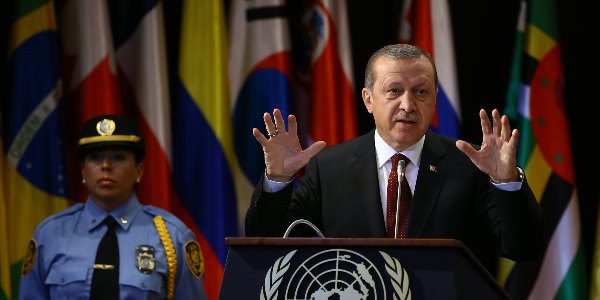
After President Recep Tayyip Erdoğan’s official visit to the three Latin American countries of Chile, Peru and Ecuador, the presidential systems implemented in the region have become one of the hot topics of discussion about political systems and a new constitution in Turkey. Contributing to these discussions appropriately without misunderstanding and prejudice is difficult, as they are critical. After the 1990s, Latin American countries underwent democratization processes and the position presidents played was significant in these processes. Thus, understanding the outlines of the Chilean system can be an initial point to comprehend other areas of the region. THE EXECUTIVE BRANCHEven if the historical roots of the presidential system in Chile can be traced back to its 1925 constitution, the system in effect today was established after the 1980 constitution. Chile has a unitary and bicameral system where the state administration is functional and territorially decentralized. According to Article 25 of the 1980 constitution, to be elected president of the Republic, the candidate must have Chilean nationality, be up to or over 35 years of age and hold the other qualities necessary to be citizen. The president can exercise his functions for a period of four years and may not be re-elected for the following period. In other words, at least a one-term break is compulsory. The president is elected by direct vote, winning by receiving the absolute majority of valid votes. The presidential election is held in conjunction with parliamentary elections in the manner determined by the respective constitutional law. If the presidential election that contains more than two candidates and none obtain more than half the valid votes, there will be a second round of voting to limited to the candidates who obtained the two highest vote totals and the winner is the one that receives the most votes. This new vote is verified in the manner prescribed by law. As the head of the executive branch, the president has broad authority with special powers such as contributing to the making of laws under the constitution, sanctioning and promulgating them, convening and closing the Congress by stating the reason, declaring states of exception in cases and forms prescribed in the constitution, and to appointing and removing ministers, deputies, mayors, governors, ambassadors, diplomatic ministers and representatives from international organizations at will. Besides these powers, the president can appoint magistrates and prosecutors from the Courts of Appeals judges and lawyers on the proposal of the Supreme Court and the Courts of Appeal, respectively, members of the Constitutional Court, and judges and prosecutors of the Supreme Court and the attorney general with the consent of the Senate. After the constitutional amendment in 1989, the president’s right to dissolve parliament was abolished. When it comes to the budget, the president, with the signature of all the ministers of state, can decree payments not authorized by law to meet needs arising from postponed public calamities, foreign aggression, internal commotion, serious injury or danger to national security or the depletion of resources to maintain services that cannot be stopped without serious damage to the country. Payments made under these circumstances cannot exceed 2 percent annually of the amount of expenditure authorized by the Budget Law. After the election, the president’s relations with his political party automatically end. However, because of dominance of political parties in the system, the president unofficially maintains his relations. THE LEGISLATIVE BRANCHThe National Congress of Chile (Congreso Nacional) is based on a bicameral system consisting of the Chamber of Deputies (Cámara de Diputados) with 120 members and Senate (Senado) with 38 representatives. The Chamber of Deputies is composed of members elected by the direct vote of constituencies and is renewed in full every four years. Senators remain in office for eight years and half of them in turn are renewed every four years through a binomial system. This system separates the country into senatorial districts and each of them has at least one representative. The exclusive powers of the Chamber of Deputies are to supervise the acts of the government by adopting agreements or suggesting observations, summoning a minister of state under special circumstances, creating special investigating commissions at the request of at least two-fifths of the deputies, declaring whether or not there have been accusations of the president seriously affecting the honor and security of the nation or openly violating the constitution or laws. In the case of the Senate, its exclusive powers are acting as a jury in investigating commissions, hearing jurisdictional disputes that arise between political or administrative authorities, granting recovery of citizenship and declaring the incapacity of the president arising from physical or mental impairment. THE JUDICIAL BRANCHThe-20 member Supreme Court of Chile is at the highest point of the judicial system in the country. Except the Constitutional Court, Board of Election and Military Courts, all courts are under supervision of the Supreme Court. The president of the Republic, with Senate approval, appoints judicial the prosecutors of the Supreme Court. The president of the Republic also appoints judicial ministers and attorneys of the Courts of Appeal while the Supreme Court proposes three candidates. Judges can be discharged on the grounds of impeachment. Superior Court judges, judicial prosecutors and lawyers of the judiciary cannot be apprehended without order of the competent court, except in cases of criminal activity. It should be noted that each presidential system, independent from legal practices and rules, has unique characteristics arising from social, cultural and traditional aspects of the specific country. Thus, a reductive approach to evaluate systems without concerning distinctive features of each country can cause misinterpretations in debates. Debates on a presidential system in Turkey should be more fact-based and offer reliable information to create a more productive platform for discussion. [Daily Sabah, February 5, 2016] |
Tag: AK PARTİ FILES
-

AK PARTİ FILES /// Presidential System : A Latin American Experi ence
